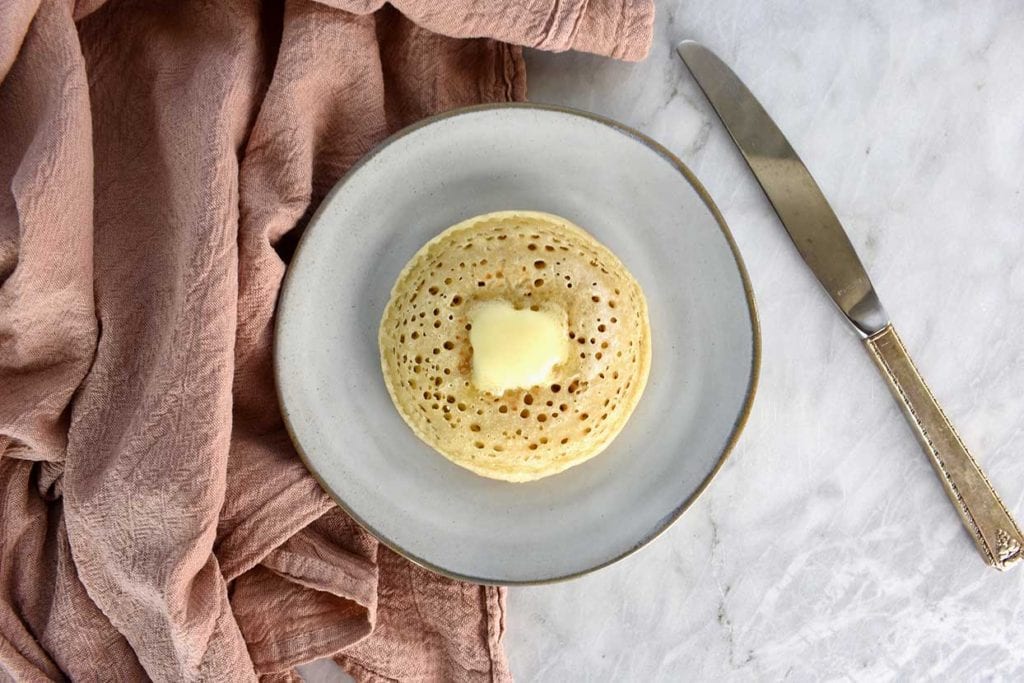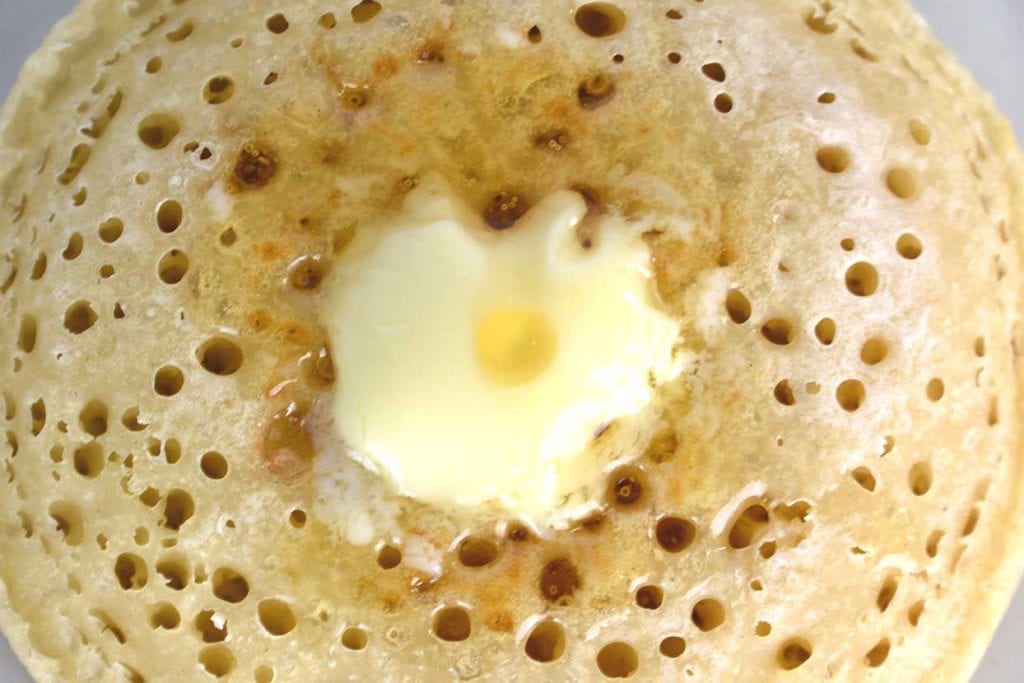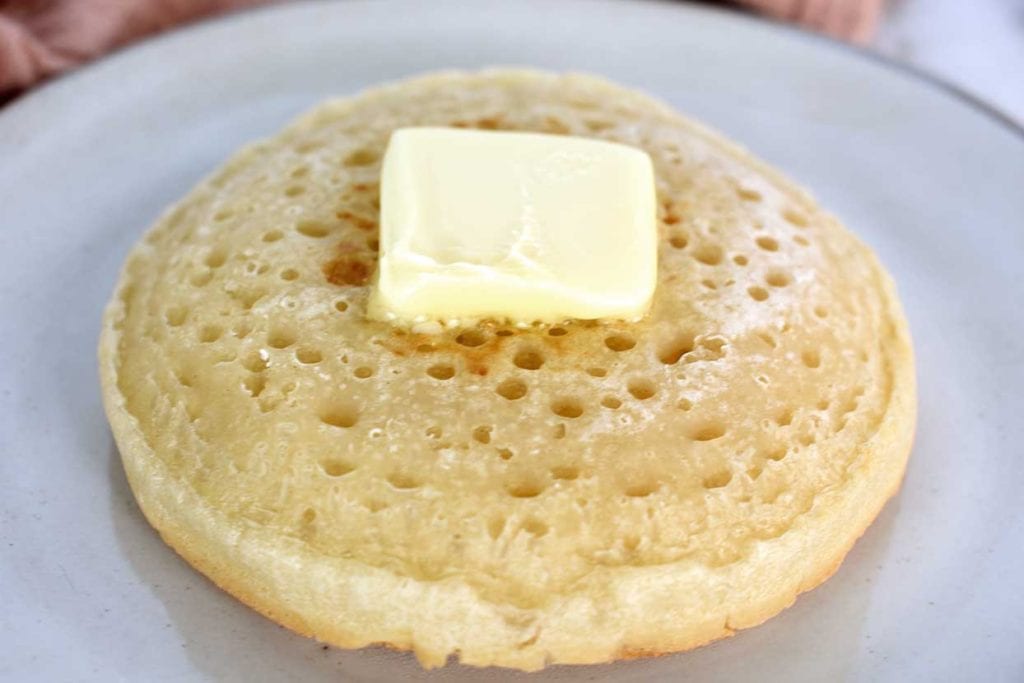
Crumpets are curious cakes with English origins that don’t get enough American love .
If you’ve ever come across crumpets at the grocery store, you may have mistaken it for an English muffin, a reputation worth demystifying. I was probably in second grade the first time I had a crumpet. Our neighbors from Minnesota with Irish roots introduced them to me. Like most people, from the aesthetics, I expected English muffin. But I was delighted and surprised at their chewyness and how well the tiny holes soaked up the butter and honey to ooze out with each bite. It’s a fond memory that I too rarely repeat.
I had kind of forgotten about them until the pandemic started. While we Americans were scrambling for sourdough recipes to bake up during lockdown, Brits were searching for crumpet recipes on top of sourdough to keep them occupied (perhaps they wanted to use the sourdough starter in the crumpets—excellent way to repurpose sourdough starter). With a devotion that deep, I wanted to find exactly what makes them so special.
So, if you can’t decide if you should try a crumpet or you want to play it safe with an English muffin, here’s everything you need to make an informed decision.
British Teatime Treat
Similar to pancakes and English muffins, crumpets are just a type of pancake. However, the ingredients are a bit different. Those slight differences result in very different (but delicious) edible experiences.
Pancakes, Crumpets and English Muffins
The main ingredients in a crumpet recipe are flour, water, salt, sugar, baking powder and yeast. It’s pretty simple—no egg and no fat are involved. In contrast, both English muffins and pancakes call for eggs. And while English muffins require yeast to rise, pancakes rely on baking soda or baking powder to puff up.
So that’s what makes crumpets unique: they use both baking powder and yeast to help them rise.
How to Make Crumpets
Making crumpets is slightly unusual. First, you make the batter by mixing together the flour, water and salt. A mixture of yeast, sugar and warm water are added separately along with the baking powder. When everything is mixed together, the batter is set aside to rise like any other yeast dough.
The batter is then poured into a greased crumpet rings (like a biscuit cutter or a cookie cutter or even English muffin rings!) sitting on a heated griddle. Some recipes suggest using a tuna can with the top cut off. I have no idea how one would cut the top off a tuna can without destroying a valuable kitchen tool. Instead, I use wide-mouth mason jar lids (just the bands).
Once they’re in the mold, you let them cook for about 4 minutes and holes form in the tops. The signature holes are created by gas (formed by the baking powder) escaping during cooking. They should be done at this point with golden brown tops and bottoms and you can remove the rings. However, sometimes you might need to flip them like a pancake to make sure they’re cooked on both sides. But otherwise, they’re ready to toast and embellish with butter and jam. (Just remember to always serve warm.)

Crumpet History
Crumpets have also been compared to New Zealand’s pikelets and Welsh crempogs or crempot and Breton krampouezh. Pikelets and crempogs are very much pancakes—the ingredients and method for making them are the same. Krampouezh are also griddle cakes, but those are more like crepes than pancakes.
Down Under
Crumpets are quite popular in Australia as well. It was one of the recipes they were looking for at the start of the pandemic. But Australians have this whole other love for these griddle cakes. Just after the world went into lockdown, an Australian company re-introduced the “Golden Crumpet Toast.” It’s basically a loaf of bread that tastes like crumpets. They sold it about ten years ago but discontinued it, to many’s chagrin, but it’s back! And you don’t need a griddle to get a taste (but ordering it might be challenging).
Slang
The word “crumpet” is also British slang for a woman who is enthusiastic about carnal activity, kind of like “tart.” It’s not a very nice term. Don’t use “crumpet” to describe anything but breakfast griddle cakes you toast.
